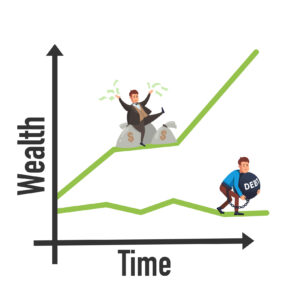The role of debt in our lives is an important concept in personal finance. I previously described the principle to “spend less than you make.” Therefore, it is important to understand how debt, an option that allows you to pay for something with more money than you have today, works, and how to harness it responsibly. Financial realities can challenge financial principles, so the ability to work through life’s ups and downs without compromising financial principles is key. Debt is likely to play a role in your life in some form or another. We ought to understand it, appreciate its impact on us, and develop strategies for managing it.
According to a 2020 Experian Consumer Credit Report, the breakdown of average debt by person in the United States was as follows:
- Average Mortgage Balance = $208,185
- Average Student Loan Balance = $38,792
- Average Auto Loan Balance = $19,703
- Average Credit Card Balance = $5,313
Not all debt is created equal, but no matter what you call it, a debt is a transaction that allows you access to money today in exchange for a promise to pay back the original amount (principal) plus an additional cost (interest) in the future. Let’s compare the most common forms of debt that people experience:

Anytime you are going to borrow money, be it to buy a house through a mortgage or letting your credit card balance grow from personal expenses, there are real financial consequences. Borrowed money is not “free” – it must be paid back with interest and since banks and credit card companies are not charities – their profit is your expense. I always ask myself the following questions when it comes to borrowing money:
- Is this debt to pay for a need or a want?
- Is this debt connected to an asset that should appreciate in value over time?
- What is the interest rate and repayment terms and will I be able to add the monthly payments comfortably to my cash flow plan?
Question #1 – If your answer is “for a want”, I would recommend delaying the purchase and start setting aside money for it. A couple of things might happen: Firstly, you might realize that what you “just had to have” was not really that important all together and secondly, if you really do want it, paying for it with your own money, at least in part, will be a cheaper option than letting interest charges build up just swiping your credit card and not paying off the balance in full when due.
Question #2 – When it comes to a mortgage (asset = house) or a student loan (asset = future earnings power), the answer is yes – all other debts, with the exception of business-related debt, are not connected to an appreciating asset. Be smart about your debt. Even if the debt should help contribute to a higher net worth in the future, there is going to be a monthly cash flow impact of paying back the debt. Remember, you can’t pay back your mortgage with a portion of that extra master bath jacuzzi you just “had to have”, you need liquidity. Avoid being “house-rich” but “cash-poor”. In terms of student debt, keep in mind the increased earning potential your career choice will have (especially in the early years) and balance that against the amount of student loan debt to take. Just because you can access a lot of debt does not mean you should! All other debt not related to an appreciating asset should be avoided unless it is absolutely necessary to your current situation. Cars, even used ones, are not cheap – so it might be necessary to obtain a loan in order to buy a car that is needed to commute to a job or school. I recommend prioritizing your savings so that you can buy a dependable used car in cash. Any other consumer debt simply should be avoided at all costs. Just like earning compound interest will work wonders for your net worth, paying compound interest will erode it. Credit card expenses that exceed your income is a toxic equation that never ends well. Instagram influencers and TikTok superstars telling you about what you “must have” don’t know about your personal financial wellbeing – their incentive to sell is not always aligned with your incentive of living a fiscally responsible life.
Question #3 – it’s time to crunch the numbers. Take a look at whatever you are borrowing and make sure you’re getting the best interest rate that you can. Be sure to also confirm what the repayment terms and amounts will be*.

Be the Credit Card Companies’ Worst Customer
There is so much more to say and nuance around consumer debt. One thing is for certain – avoid credit card debt at all costs. This does not mean don’t use credit cards, although if you have trouble controlling your spending, cutting out credit cards is a smart guardrail. Interest on credit cards will begin as soon as your payment due date has passed and the outstanding balance is not paid off in full. Interest rates on credit cards are high (avg ~ 16.6%) and compound painfully over time.
Falling into credit card debt is easy. Getting out can be hard. And guess what? Credit card companies love that! It’s how they keep their shareholders happy – be the credit card company’s worst customer by using a credit card, collecting any rewards offered, and then set the “pay balance in full” option electronically. Credit cards are great for making fast and secure payments, and they are also great for helping track and categorize expenses. Use them to your benefit, but when it comes to rolling a credit card balance month to month – just say no!
